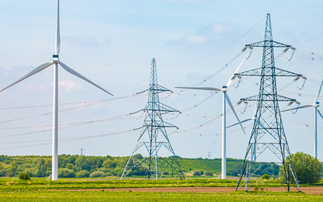
The Energy Security Strategy contains a welcome boost for offshore wind, nuclear, and hydrogen, but on almost every other front it is not fit for purpose
The long-awaited and much-delayed Energy Security Strategy will be released today. It won't improve security for years and it's not particularly strategic. It is about energy at least, but only energy generation.
The plan that Boris Johnson promised would respond to the worst energy security threat the UK has faced in nearly 50 years, the worst cost of living crunch in a generation, and a climate crisis that scientists warned once again this week is at risk of spiralling out of control amounts to a missed opportunity so big you could see it from space, or more pertinently the Kremlin.
It begs the despairing question that if the Treasury and parts of the Conservative Party will not back ambitious energy efficiency measures and rapid decarbonisation plans in the face of very real threats from a hostile power, a petro-funded war on European soil, and a cost-of-living crisis that could very well cost them the next election, what will it take? No one expected them to get fully on board with the idea that a climate emergency required an emergency response, but it is surprising the Conservative Party would respond so inadequately to a real and present threat to national security. How have a small band of Tory MPs been allowed to prioritise their aesthetic distaste for wind turbines over Ukraine's pleas for an end to Russian gas exports and their constituents' pleas for lower energy bills?
It is worth remembering why this Energy Security Strategy was necessitated in the first place, because the Treasury has clearly forgotten. Vladimir Putin launched an illegal war of an aggression against Ukraine, unleashing some of the worst atrocities seen on European soil since the Second World War, reigniting the Cold War nuclear stand-off, and sending energy prices spiralling.
The Russian war machine is funded through exports of fossil fuels and with NATO unwilling to directly engage in the fight the Ukrainian government is begging for its Western allies to halt imports of Russian oil, gas, and coal. These pleas have been rejected to date, but the EU has launched a sweeping plan to try and slash gas imports as quickly as possible, with many European countries also ramping up direct support for consumers and businesses struggling with soaring energy bills. Just this week, the German government announced an 'Easter Package' promising to pump billions of Euros into energy efficiency improvements and a surge in renewables development, as it looks to end Russian coal and oil imports this year and halt gas imports by mid-2024. The ground is clearly being laid for the EU to follow Lithuania's lead and eventually halt Russian gas imports if it feels it needs to.
That is the current context, but the situation could get a lot worse before it gets better. Barring the absolute best case scenario - Russia's military is comprehensively defeated in Ukraine and the Putin regime collapses - all other credible scenarios contain the very real risk that the Kremlin moves to further weaponise oil and gas supplies going into this winter and beyond. Even a temporary halt to exports, which Russian officials have already threatened in response to sanctions, would create real energy shortages across Europe and spark economic chaos. If you are able to shrug off the moral case for doing everything in our power to end the funding Russian aggression, what of the simple national security need to protect ourselves from this looming threat?
The UK may be less reliant on Russian oil and gas than our neighbours, but we are fully plugged into international oil and gas markets. Prices would still surge if supplies are restricted further. Equally, any gas we do not use here could be diverted to our allies in Europe and displace Russian imports. But instead of producing a strategy that seeks to rapidly reduce gas imports this year and next, as was originally trailled, the government will today publish a long-term vision for boosting domestic energy generation from the late 2020s onwards. It is simply not fit for purpose.
That is not to say there are not good things in this strategy. The new 50GW by 2030 target for offshore wind capacity is a welcome step forward that looks achievable, especially if the government makes good on its pledge to streamline planning, permitting, and grid connection processes. The already rapidly expanding offshore wind industry looks set to be turbocharged.
The doubling of goals for hydrogen production backed by new auctions for green hydrogen plants is a similarly savvy move, which will help catalyse a crucial new industry and tackle some of the intermittency issues associated with the massive new fleet of offshore wind farms. There are some encouragingly warm words on tidal power and geothermal energy. More ambitious targets for solar deployment are also welcome, even if delivering on them depends in large part on the result of a promised consultation on relaxing planning rules that is bound to face opposition from some of the usual suspects.
The centrality of nuclear to the new Strategy will be much more contentious, with the government betting big that an industry with a long track record of delays and cost overruns can deliver this time. However, the target to deliver 24GW of nuclear capacity by 2050 does provide some much-needed certainty, as will the launch of the new Great British Nuclear agency. The hope is that all goes to plan and the UK will be able to tap into a major new source of low carbon power from the 2030s onwards, but myriad barriers to development and cost concerns remain and there is no way the new programme will make a meaningful contribution to energy security this decade.
It is notable the one concession the Treasury appears to have made in the weeks of negotiations with Number 10 and BEIS is for this more ambitious nuclear target. But those targets can then only be achieved if the Treasury later signs off on the detailed contracts that can get new reactors to a final investment decision - contracts that will each time spark headlines about how much they will add to energy bills.
Overall, the plan will unleash increased green investment, especially in offshore wind, solar, nuclear, hydrogen, and supporting grid upgrades. But it is hard to discern anything here that moves beyond filling in some of the policy gaps that should really have been plugged in the Net Zero Strategy last year. The government is simply doing the things it should already have done to deliver on its climate goals. Moreover, there is nothing new on the crucial carbon capture hubs that remain in the pipeline, beyond a reassertion that they will be delivered in the coming years. The government has confirmed new licenses for oil and gas exploration and is once again flirting with fracking, but the Strategy contains no evidence of an acceleration of carbon capture and storage development, despite its centrality to the UK's long-term net zero plans.
However, the biggest and most glaring flaws in the strategy are in the two areas that could have actually improved energy security this year and next: onshore wind and energy saving.
The Strategy does leave the door ajar for some onshore wind development, with proposals for a new mechanism for offering financial incentives to communities that agree to host projects. But the language announcing this move is striking, promising that the approach would only be offered to "a limited number of supportive communities" (my italics).
There is only one conclusion to be drawn from this flat refusal to countenance a relaxation of planning rules for onshore wind farms: Boris Johnson has prioritised the views of Tory MPs and the handful of voters who loathe wind farms over the plight of the Ukrainians, the UK's energy security, and the crippling bills of the fuel poor. We will all be poorer and less secure as a result.
The inaction on energy efficiency and energy saving is arguably even more shameful and fundamentally unserious. The government's response to what promises to be the worst fuel poverty crisis and gas supply crunch on record is a new £30m heat pump innovation competition next year and an energy advice site on gov.uk from this summer. People are freezing in their homes here and cowering in terror in their homes in Ukraine, and yet Rishi Sunak has prioritised tax cuts before the next election over meaningful action now.
This is the backdrop against which the Treasury rejected even modest proposals for a £200m uplift in the ECO energy efficiency scheme, refusing to reopen the last Spending Settlement, despite the most traumatic change in circumstances. Meanwhile, there was scant progress on tackling the skills gap that is set to hamper the otherwise welcome moves to accelerate domestic clean tech deployments through the recent cuts to VAT and launch of the heat pump grant scheme. The public information and advice campaign to help people optimise their boiler flow temperatures and reduce their fuel use remains notable only by its absence.
The government will try to argue that there is no alternative, that its fiscal hands are tied. Johnson was yesterday at pains to claim that "there's a limit to the amount of taxpayers' money we can simply push towards trying to deal with global energy price spikes".
But other options were available. The government could have borrowed to invest in building upgrades that would save money, create jobs, improve health outcomes, reduce gas imports, and cut carbon emissions. It could have made new North Sea oil and gas licenses contingent on overhauling the tax regime to match the billions Norway generates from the oil majors in its waters. It could have told housebuilders that the timeline for introducing zero carbon homes standards is to be pulled forward. It could have reversed the cuts to EV grants. It could have urged the public to take modest measures to curb energy use. It could have said onshore renewables projects will be built, and will be built as fast as possible. It did none of these things.
In response to any criticism of such radical moves, the government could have seized the moral authority that Putin's horrific aggression has bestowed upon it. It could have argued that we will do out bit to help our allies and take the steps necessary to bolster our own security in the face of a grave threat. It could have made plain that to do any less would be beneath us. It could, to borrow Extinction Rebellion's rallying cry, have told the truth.
None of this is as difficult or as unpopular as the government seems to think, other countries are doing it.
A serious government with strong leadership and a commitment to acting in the national interest could have delivered a Strategy that met the challenge before it. Instead we have a Strategy that does little more than plug some of the gaps in the Net Zero Strategy that last year similarly failed to rise to the historic nature of the moment we find ourselves in. The net zero transition will accelerate as a result of the measures announced today, but not by enough - not nearly enough.
This week in news that was widely and understandable overshadowed by the appalling images coming out of Ukraine, the IPCC warned once again that the world was failing to take the sensible, obvious, and affordable steps necessary to avert decades of rolling climate crises. In a blistering assessment of the global response to the escalating climate catastrophe, UN Secretary General António Guterres said the IPCC report was a "file of shame, cataloguing the empty pledges that put us firmly on track towards an unlivable world". It might seem unfair to suggest he could just have easily been talking about today's Energy Security Strategy, but this latest plan from the British government is of a piece with the myriad strategies all around the world that fail to recognise the true scale of the threats we face and the immense opportunities on offer if we are just brave enough to realise them. The terrible and tragic backdrop against which it has been produced only serves to highlight its inadequacy. It is a security strategy that will leave far too many people facing terrible insecurity.










